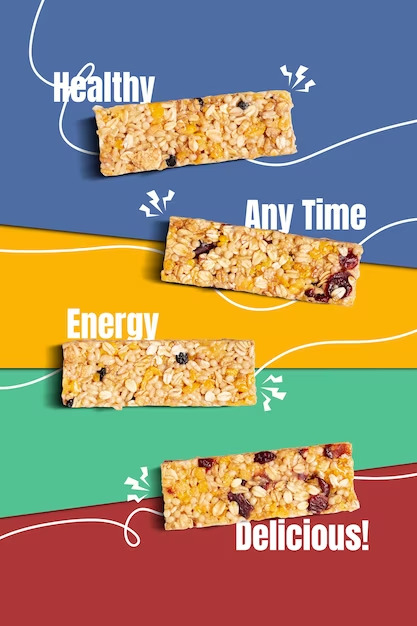Wondering what protein bar to opt for? Many people share the journey of deciding which protein bar to choose and whether it’s suitable for daily consumption. Incorporating anything new to your daily routine could be tricky and when it comes to your diet, it is crucial to know all the pros and cons of it. Even the healthiness of a protein bar varies by brand and flavor. The question of whether protein bars lead to weight gain is common, and the answer isn’t straightforward. Although protein bars can be calorie-dense, they don’t automatically cause fat accumulation. It depends on the quantity consumed and the other foods you eat alongside them.
Protein Bars & Fat
Protein bars when enjoyed in moderation, make for a beneficial snack, offering essential energy and nutrients. However, excessive intake of protein bars could potentially contribute to weight gain. The key is moderation.
Considering the overall calorie content of each bar is crucial in your selection. Like any food, it’s advisable to consume protein bars in moderate amounts. A bar that exceeds over 300 calories, would be considered too much for one serving.
Which brings us to the next important realization that, if you are not engaging yourselves into regular exercises and still choose to incorporate protein bars along with the daily nutritious food, weight gain is bound to happen. For best results, you should consume fruits, vegetables and lean proteins paired with the protein bars.
Be Cautious of Warning Signs
- Elevated sugar levels: Despite being promoted as low-sugar, some protein bars harbor significant added sugars or artificial sweeteners. Scrutinize the label to ensure these ingredients are absent.
- Excessive additives: Opt for protein bars crafted with natural ingredients, avoiding artificial additives, colorings, and preservatives.
- Trans fat: Verify the absence of partially hydrogenated oils or other trans fat sources on the label, as these can pose health risks.
- Low-quality proteins: Some bars may feature inferior proteins like soy protein isolate or whey protein concentrate. Always go for a protein bar which is extracted from high-quality plant based sources such as whey protein or pea protein isolate.
- High saturated fat: To reap the benefits of protein bars, you should go for a bar that has not more than 3 grams of saturated fats because too much saturated fats can also cause health problems.
- Elevated sodium content: Excess sodium intake can contribute to health problems, so select protein bars with reasonable sodium levels.
Choose protein bars with at least 3 grams of fiber per serving for essential health benefits. Be cautious about calorie content, opting for bars with no more than 250 calories per serving to prevent potential weight gain. Despite the general perception of protein bars as nutritious, it’s crucial to watch for warning signs. Ensure the bar aligns with your daily calorie limit, especially when aiming for weight loss (typically 200-400 calories below maintenance). This deficit encourages your body to utilize stored energy, burning more calories than consumed, ultimately promoting weight loss.
If your protein bar is high in calories, common in bars with elevated protein percentages, limit your consumption to 1-2 bars a day.
Secondly, while protein is beneficial, excessive intake isn’t. Protein bars often serve as a go-to snack for weight loss due to protein’s appetite-curbing effects and its role in muscle mass, strength, muscle recovery, and blood pressure maintenance.
Balancing protein intake is crucial. For a normal healthy adult with minimal exercise in his daily routine, should consume around 8 grams of protein per kg of their body weight. And those who engage themselves in physical activities whether it be easy, moderate or intense, should consume 1 to 1.6 grams. Excessive protein intake can negatively affect the liver, increasing the risk of non-alcoholic fatty liver disease, particularly in individuals with obesity. In simpler terms, consuming an excess of protein may result in weight gain and the substitution of carbohydrates for fats. Therefore, when choosing a protein bar, ensure its protein content aligns with your average intake and doesn’t surpass it.
How To Choose A Protein Bar That Will Not Make You Fat?
Calories Per Serving
Start by checking the total calories in your protein bar, a critical factor. Ideally, experts advise opting for a protein bar with approximately 200-400 kcal. This range provides satiety without consuming a significant portion of your daily calorie allowance.
Protein Content
Ensure your chosen bar contains an adequate amount and quality of protein. Verify that it features high-quality sources such as milk, whey, eggs, or plant-based protein. Calculating your daily protein needs to make an informed choice.
Fats
Examine the fat content, considering the source. Understanding the origin of fats is crucial, especially for those on a keto diet, where healthy fats are emphasized while keeping carb intake low.
Fiber
For prolonged satiety and weight management, opt for a bar with a substantial fiber level, typically recommended at around 3-5 grams.
Sugar
Ensure your protein bar uses natural sweeteners like stevia, monk fruit, or allulose. Avoid bars with artificial sweeteners or sugar alcohols like sorbitol and maltitol, known for causing bloating. Keep added sugar below 5 grams.
Preservatives
Avoid protein bars with artificial flavors and colors. Opt for bars with simple, clean ingredients that you are familiar with and recognize as beneficial for your health.
Bottom Line
In summary, protein bars provide essential ingredients for maintaining health and vitality. It is important that you choose the best protein bar, when it comes to providing yourself with a healthy nutritive snack. While you choose, be careful and look for the ingredients, it should not be high in calories and the sugar content should also be minimal or should not contain extra sweeteners. If you adhere to the above mentioned guidelines, you would not overdo the recommended calorie or protein limits. It is very easy to incorporate in your daily routine without risking your health and worrying about gaining weight. Stay conscious of your overall consumption for a balanced approach. Read this blog and clear your thoughts about the protein bar that they will make you fat or not. Hence you will also learn about how to select the right protein bar.













